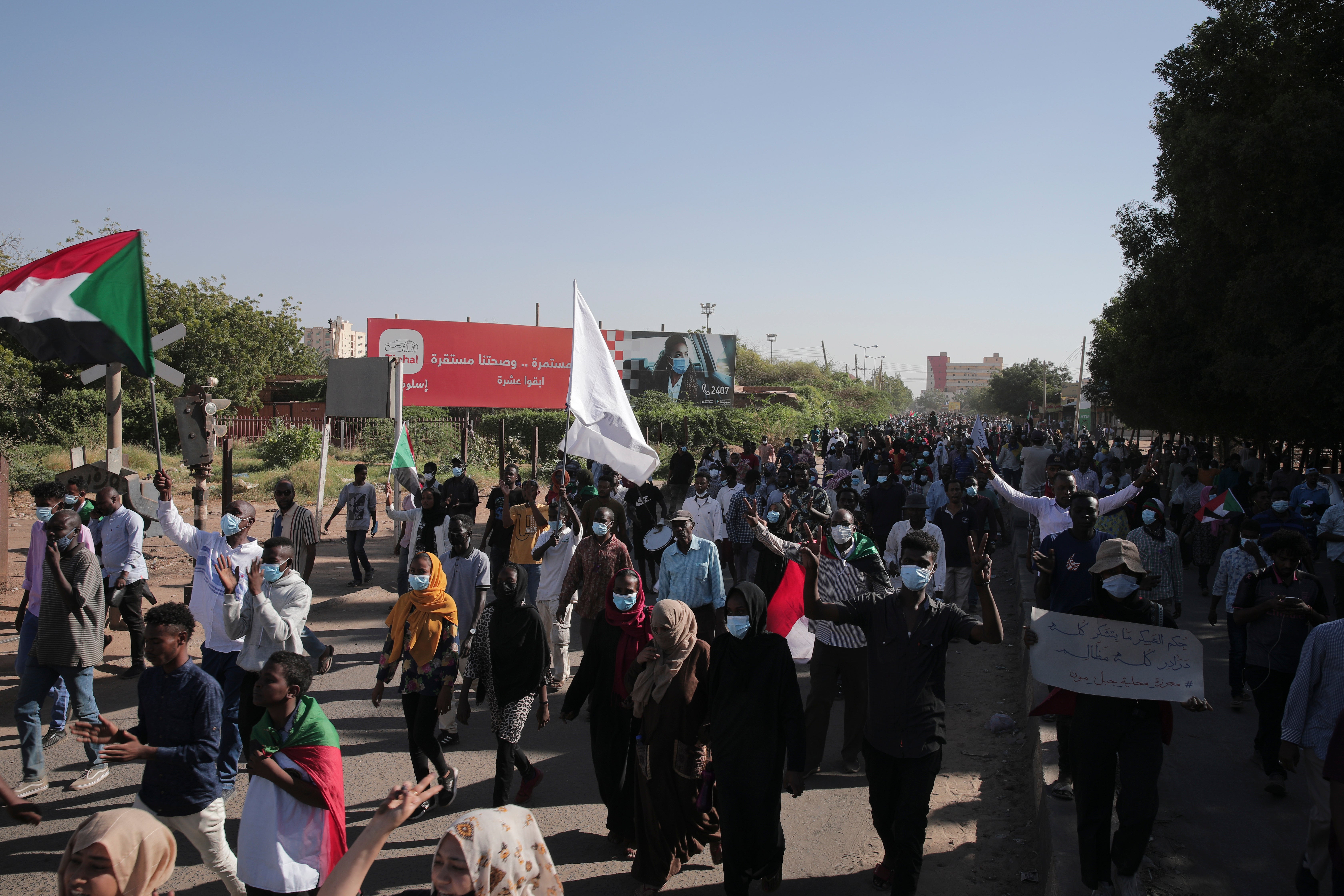Sudanese protest military coup, deal that reinstated PM
Thousands of Sudanese have taken to the streets in the capital of Khartoum and other cities

Your support helps us to tell the story
From reproductive rights to climate change to Big Tech, The Independent is on the ground when the story is developing. Whether it's investigating the financials of Elon Musk's pro-Trump PAC or producing our latest documentary, 'The A Word', which shines a light on the American women fighting for reproductive rights, we know how important it is to parse out the facts from the messaging.
At such a critical moment in US history, we need reporters on the ground. Your donation allows us to keep sending journalists to speak to both sides of the story.
The Independent is trusted by Americans across the entire political spectrum. And unlike many other quality news outlets, we choose not to lock Americans out of our reporting and analysis with paywalls. We believe quality journalism should be available to everyone, paid for by those who can afford it.
Your support makes all the difference.Thousands of Sudanese took to the streets Monday in the capital of Khartoum and other cities in the latest protests against the October military coup and subsequent deal that reinstated Prime Minister Abdalla Hamdok
Footage circulated on social media purportedly showed demonstrators marching in different locations in Khartoum and its sister city of Omdurman. There were also protests in other cities, including Kassala, Sennar and Port Sudan.
Security forces fired tear gas to disperse protesters marching in a street near the presidential palace in Khartoum, activist Nazim Sirag said. There were no immediate reports of casualties.
In past rounds of demonstrations security forces used violence, including live ammunition against protesters, according to activists. At least 44 protesters were killed and hundreds were wounded since the coup, according to the Sudan Doctors Committee, which tracks protester deaths.
The Sudanese military seized power Oct. 25, dissolving the transitional government and arresting dozens of officials and politicians. The takeover upended a fragile planned transition to democratic rule more than two years after a popular uprising forced the removal of longtime autocrat Omar al-Bashir and his Islamist government.
Hamdok was reinstated last month amid international pressure in a deal that calls for an independent technocratic Cabinet under military oversight. The agreement included the release of government officials and politicians detained since the coup and the formation of an independent technocratic Cabinet led by Hamdok.
The deal, however, was rejected by the pro-democracy movement, which insists on handing over power to a civilian government to lead the transition. The protests came under the slogan of: “No negotiations, no compromise, no power-sharing" with the military.
Monday’s protests were called by the Sudanese Professionals Association and the so-called Resistance Committees, which spearheaded the uprising against al-Bashir and then the military coup.
Among the protesters' demands are the restructuring of the military under civilian oversight, purging officers loyal to al-Bashir and disbanding armed groups including the Rapid Support Forces
The Rapid Support Forces are a paramilitary unit notorious for atrocities during the Darfur war and a 2019 massacre of protesters in Khartoum. They are led by Gen. Mohammed Hamdan Dagalo, who is also the deputy head of the ruling sovereign council.
Dagalo is seen as the co-architect of the coup along with Gen. Abdel-Fattah Burhan, head of the ruling body.
The relentless street demonstrations have put pressure on the military and Hamdok to take measures to calm angry protesters and gain their trust. Hamdok has yet to announce his Cabinet, which is highly likely to face opposition from the pro-democracy movement.
In televised comments over the weekend, Burhan described the deal that reinstated Hamdok as “a true start” for the democratic transition.
He said they were working on crafting a “new political charter” with the aim of establishing a broader consensus among all political forces and movements.
In the western Darfur region, meanwhile, the death toll from tribal clashes over the weekend climbed to at least 48 people, all of them shot dead, according to the Sudan Doctors Committee. It said dozens of others were wounded, some in critical condition.
The fighting grew out of a financial dispute late Saturday between two individuals in a camp for displaced persons in the Kreinik area in West Darfur province.
The clashes continued Sunday, with Arab militias known as janjaweed attacking the camp and torching and looting property, according to Adam Regal, spokesman for the General Coordination for Refugees and Displaced in Darfur.
The clashes in Darfur pose a significant challenge to efforts by Sudan’s transitional authorities to end decades-long rebellions in some areas like war-wrecked region.